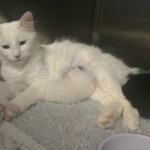 New research recently published in the Veterinary Record shows that high numbers of unwanted kittens may be caused by owners lack of knowledge.
New research recently published in the Veterinary Record shows that high numbers of unwanted kittens may be caused by owners lack of knowledge.
80% of litters were reported to be accidental.
25% of owners believed (incorrectly) that cats could not get pregnant until they were at least 1 year of age.
Further 49% of owners believed ( again incorrectly) that a female cat should have a litter before being neutered. It is estimated that the number of unwanted litters being born could be reduced by 850,000 each year if owners did not believe this last point.
We have seen far more unwanted cats and kittens in the last 12 months than is usual, so responsible ownership is needed more than ever.
We recommend female cats are neutered around 6 months of age or before if they start to come into season earlier (however it is unusual for cats to come into season before 6 months of age). Male cats should also be neutered at the same age. Please phone the surgery if you think your cat needs to be neutered.



